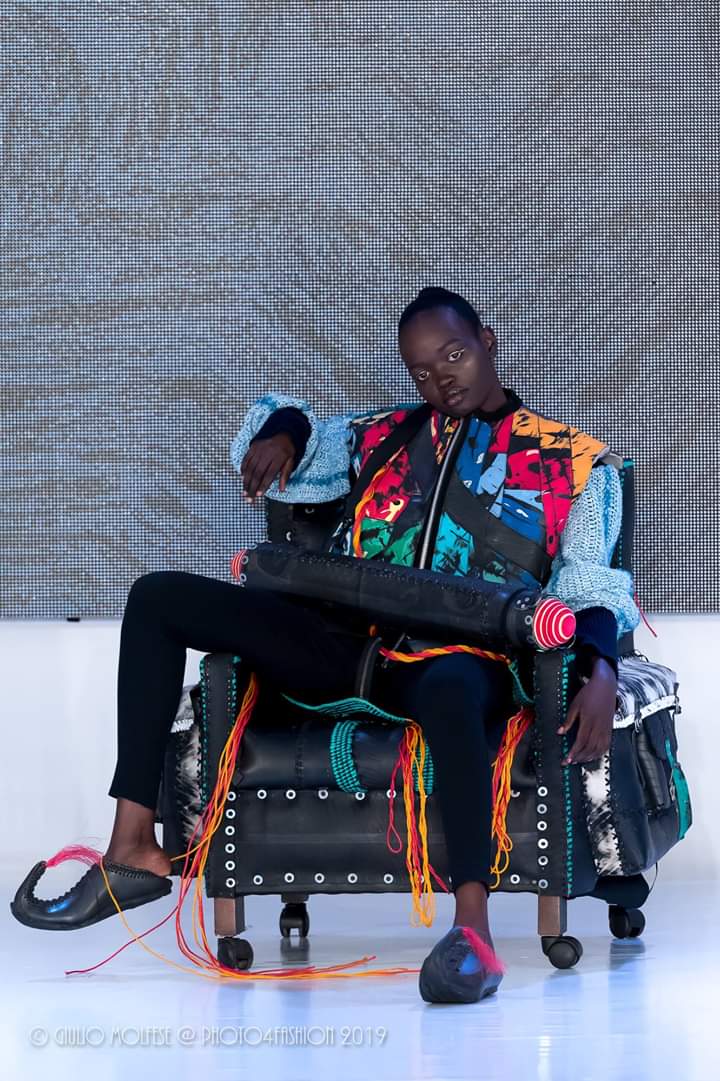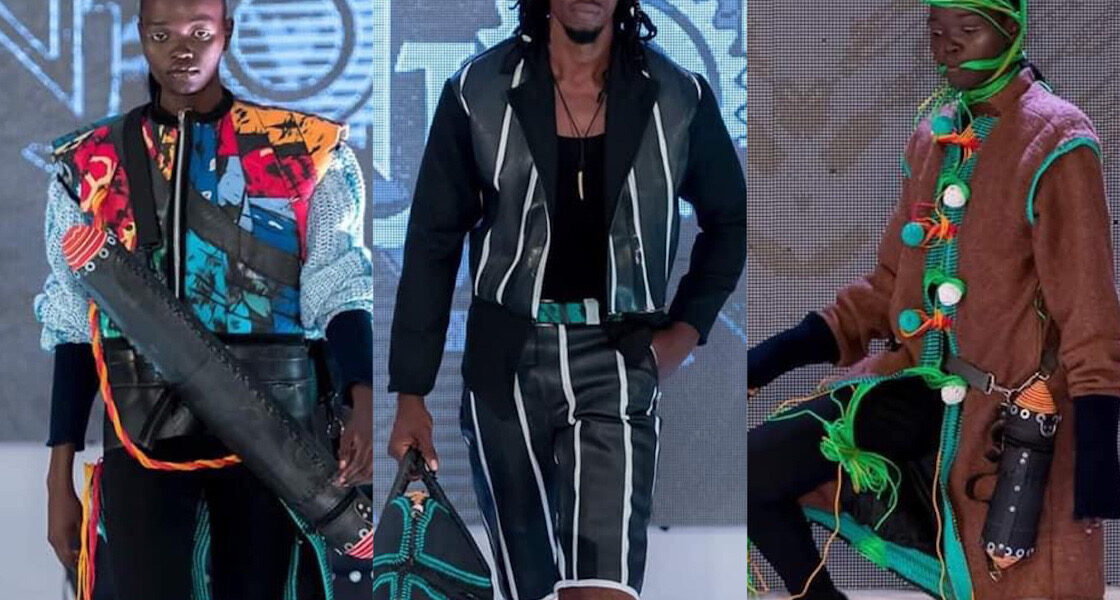Created in 2015, Njola Impressions is a Ugandan based sustainable fashion brand that recycles industrial waste materials like car tyres, polythene, plastic bottles and flip-flops into fashion accessories and furniture.

As the morning sun shines softly through Kamwokya, a city suburb in central Kampala, Old Kira Road street is buzzing with a flurry of activities; city dwellers go about their different businesses, engulfed by loud music blasting from various street speakers.
Allen Nabukenya stands beside me, shouting instructions at the top of her lungs to two gentlemen erecting a billboard mural in front of her workshop just across the street. Clad in her hard to miss Avant-garde signature style comprising of tortoise shaped boots, she looks tired but wears the look of steely determination.
“We are putting up this work. We started at 7:00 pm till now; it is already 10:00 am. We haven’t slept “, she tells me, then with a huge grin, adds, “but I am happy.”
She breaks into another flurry of instructions and I turn to examine the powerful work of art before me. Standing at over 11 by 7 ft, the billboard is unique. It is comprised of over 200 bags made out of waste materials like polythene, car tyres and flip-flops, strapped on a beautiful canvas with carefully crafted environmental messages in the local language Luganda. One reads, ‘Toyiwa mwaala kazambi’, which translates to ‘do not litter or dump waste into the water channels’.
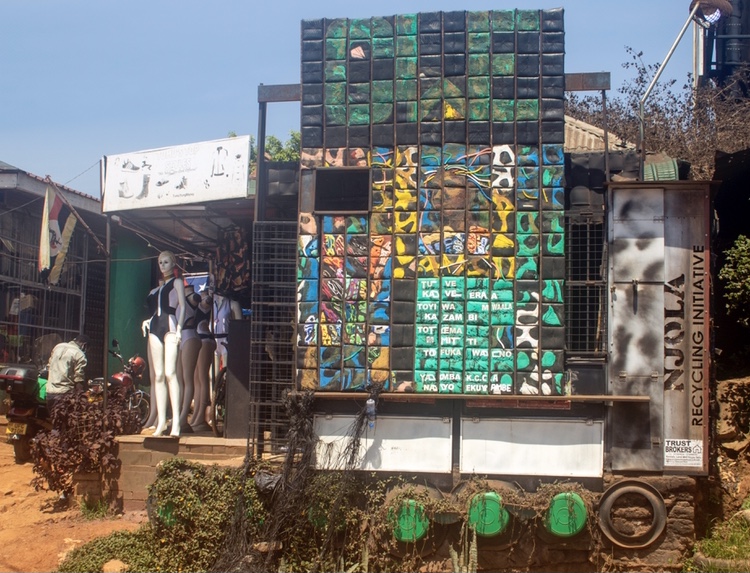
“This billboard fashion mural was inspired by the materials that we collect in the community and also we want to reach out to many people. When you make one bag and you carry it around, not many people will be able to understand your story. But with this bag mural, it is a huge big piece that someone can easily notice and maybe they can ask and we shall tell them about waste management.” She explains.
“You will find all these wordings and statements you see on the mural when you take a walk in the ghettos where we have a very huge problem of poor waste management especially polythene bags. It is very dangerous because it does not decay so we are adding our voice to remind people that ‘bave ku kaveera’, they should stop using polythene, at the same time, we are telling them ‘tebatema miti’, they should not cut trees. “
With over 600 tonnes of plastics estimated to be consumed every day and at least 51% of plastic garbage in Kampala city left uncollected while just 5% is recycled, plastic waste poses a major environmental and health threat. Besides taking over 450 years to decompose completely, it remains the major cause of clogging sewage systems in the city, resulting in flooding and disease outbreaks. Additionally, much of the waste is openly dumped or burned contributing to worsening air quality. According to a 2018 AirVisual’s World Air Quality Report, Kampala has the second-worst air in Africa, exposing the populace to diseases such as asthma, bronchitis, pneumonia, among others.
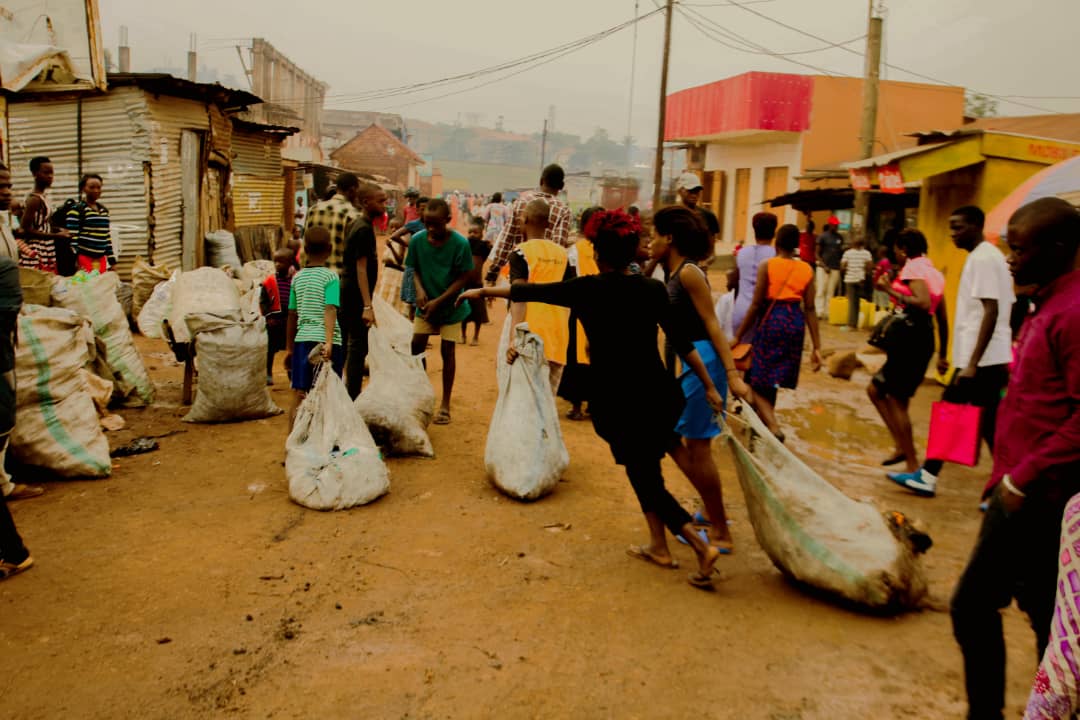
In addition to raising awareness, there’s a fun twist to the Billboard street fashion show that Allen says was funded by Creative Matterz Fund. There’s a number assigned to each bag on the mural; when one pays for a bag, they are presented numbers to chose from, the bag assigned to the number they pick is what they get to take home. And more interestingly, their name is engraved on the canvas space the bag occupied.
“We look forward to going to festivals, museums, garages to exhibit the residue with those people’s names. It shows their contribution to the cause because the proceeds will go back to the community to do more training.”
Several passersby occasionally stop to stare at the billboard. One approaches us and inquires about it. I watch closely as Allen breaks into yet another spirited explanation for the umpteenth time. From her animated tone, you can clearly tell saving the environment is something close to her heart.
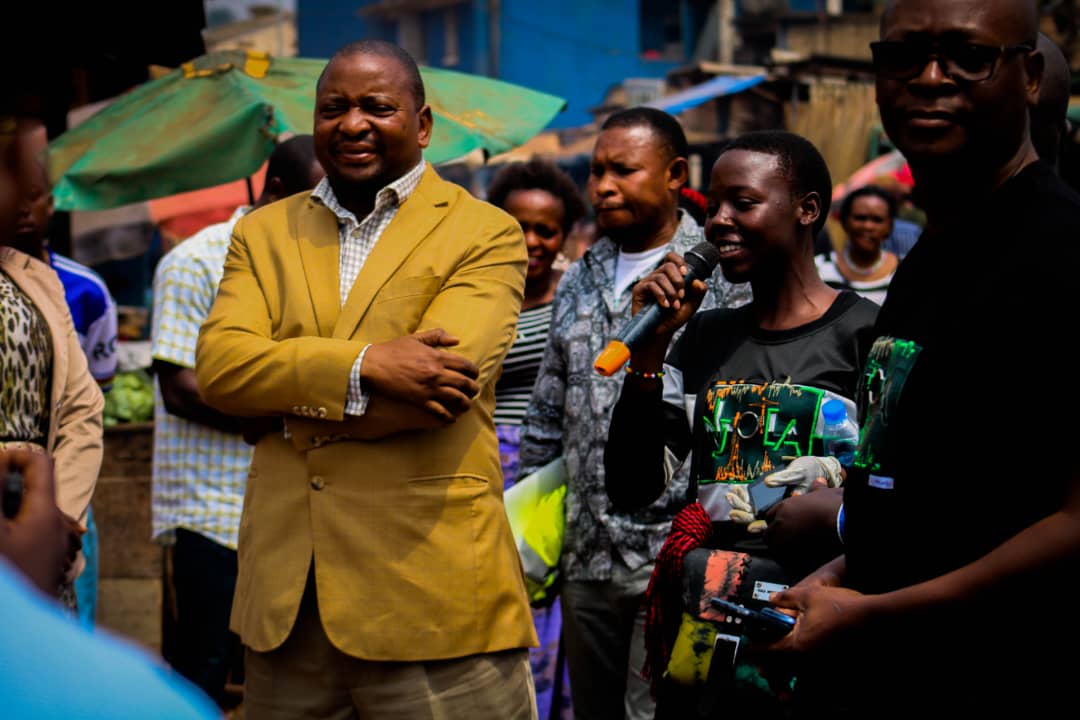
Allen’s interest in the environment was piqued while at university. In 2015, as an Art and Design student at Kyambogo University in Kampala, she was tasked to use art to solve a social-economic problem, for her research project. Hailing from Nalukolongo, one of the slums in Kampala, she says, it was easy for her to relate with and chose to work with industrial waste materials.
“I thought through everything and these materials were a big problem. Our fellow youths use these car tyres when demonstrating; they act as breeding grounds for mosquitoes, causing malaria-related deaths. This consciousness helped me want people to have a positive mindset about these materials because you know where there is a problem, there is a solution.”
This would usher her into the world of recycling.
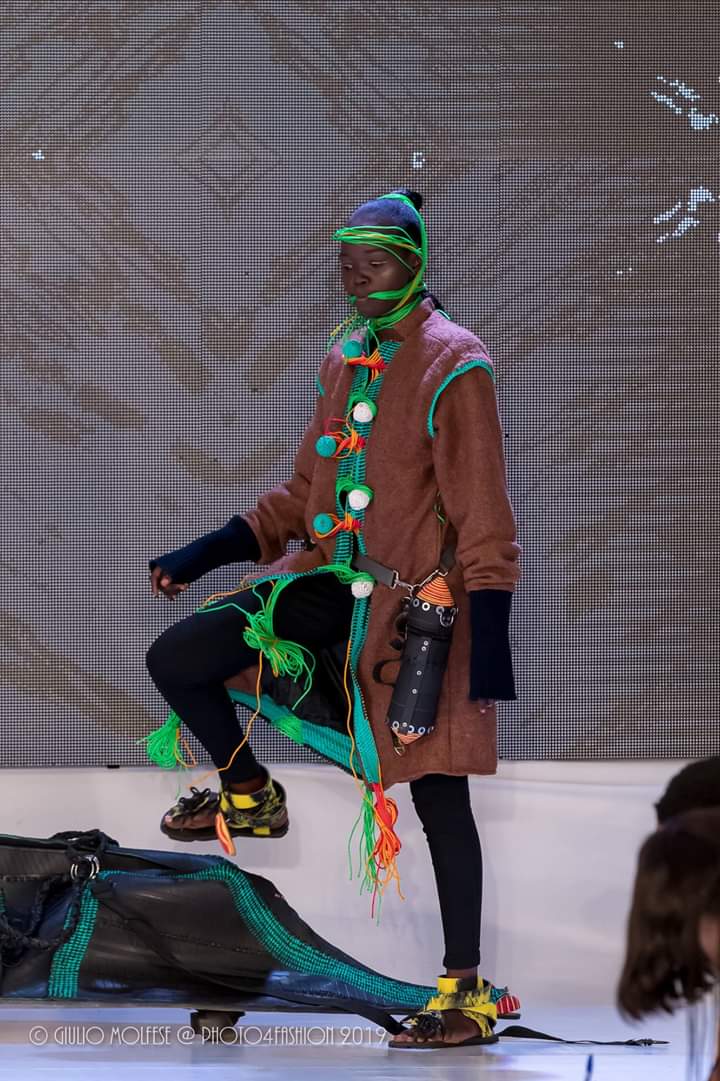
Additionally, her background, coming from an artistic family was a huge complementary factor. Growing up, she often helped her mother design and weave mats for a living. This experience, she says helped nourish her artistic talent.
Upon completing university, Allen decided to marry this passion for art and fashion with the environment, resulting in the birth of Njola Impressions.
“I didn’t have money to buy leather and other expensive fabrics but I grew up around ghetto areas and I could see these materials being dumped, I could see free polythene bags, free car tyres, so I was like why not use these materials?”
Created in 2015, the social enterprise recycles industrial waste materials like car tyres, polythene, plastic bottles and flip-flops into fashion accessories and furniture.
“I knew people love to put on good boots, nice jackets and that’s another way of passing the information since people will appreciate, the product they use in their day-to-day lives.” She tells me as we enter her workshop that is a hive of activities, filled with a variety of carefully crafted intricate fashion accessories ranging from bags, shoes, jewellery, jackets to furniture.
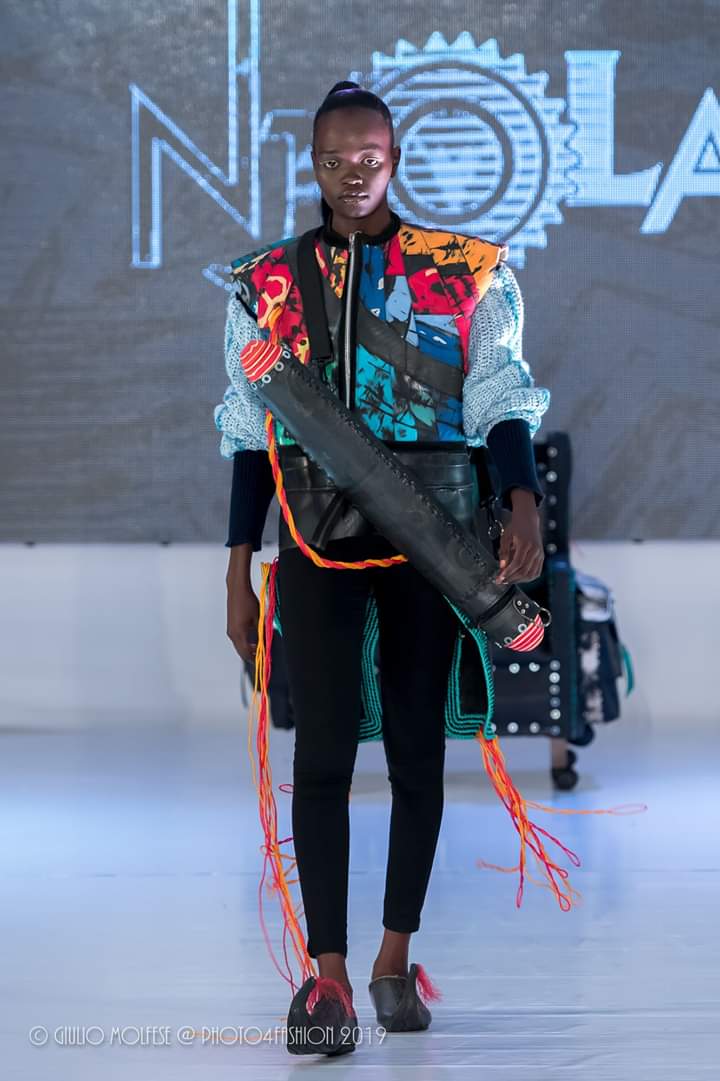
“After collecting the materials, assuming we already have our sketch, we clean them, cut, punch where necessary and then do the sewing and weaving, depending on the design, before finally assembling.” She tells me as I examine one of her bags made purely out of car tyres.
“When I am doing my work, I just get mad, I know about the elements and principles of art but you know when you are producing, because you are yourself sometimes you can just decide to follow one thing, like the line, the shape, I just feel happy because I know I am the creator.”
Njola has since evolved into a fully-fledged sustainable fashion enterprise, producing fashion accessories that have graced the runways of major fashion shows like Kampala Fashion Week and donned by both local and international celebrities including Vampire Diaries star Kat Graham, the pop star turned politician Robert Kayagulanyi aka Bobi Wine, among others.
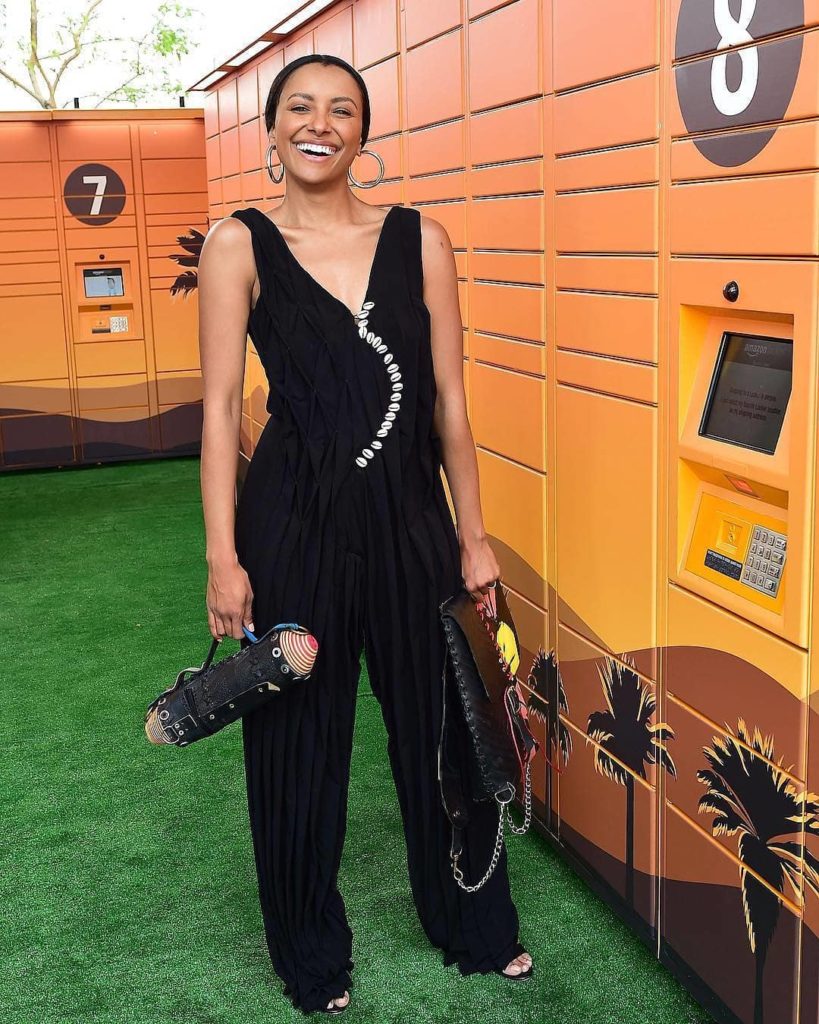
In 2018, Allen teamed up with Kampala Capital City Authority and Bobi Wine to launch the Ghetto Wardrobe Movement, an initiative that holds annual workshops to train youths from different ghettos in Kampala on recycling waste into fashion accessories. Allen says, about 300 youths have since been trained with several thereafter setting up their respective workshops.
“The people whose mindsets I have changed in the ghetto is my greatest achievement. When you have people you have everything.” She says.
However, just like any other business, Allen’s is not devoid of challenges.
“People misunderstand me because I work with materials that are misunderstood, some think that I am mad. Also, it’s hectic because these materials are very dirty, you know most people don’t know how to manage waste, the smell is not nice, but we find a way of working around this, we put on gloves and wear face masks.”
Since sustainable fashion is quite new in Uganda, Allen says the majority of her clients come from other countries like Germany, UK, the USA and France. The outbreak of the COVID pandemic meant a massive disruption in their operations coupled with a deep plunge in sales.
“I remember that time when the airport was closed, we couldn’t make any sale and up to now, people are not travelling a lot. We couldn’t also reach out and train people.“
Nevertheless, she remains steadfast in her pursuit of a waste-free environment and is banking on training more youths post-pandemic to see this dream come to fruition.
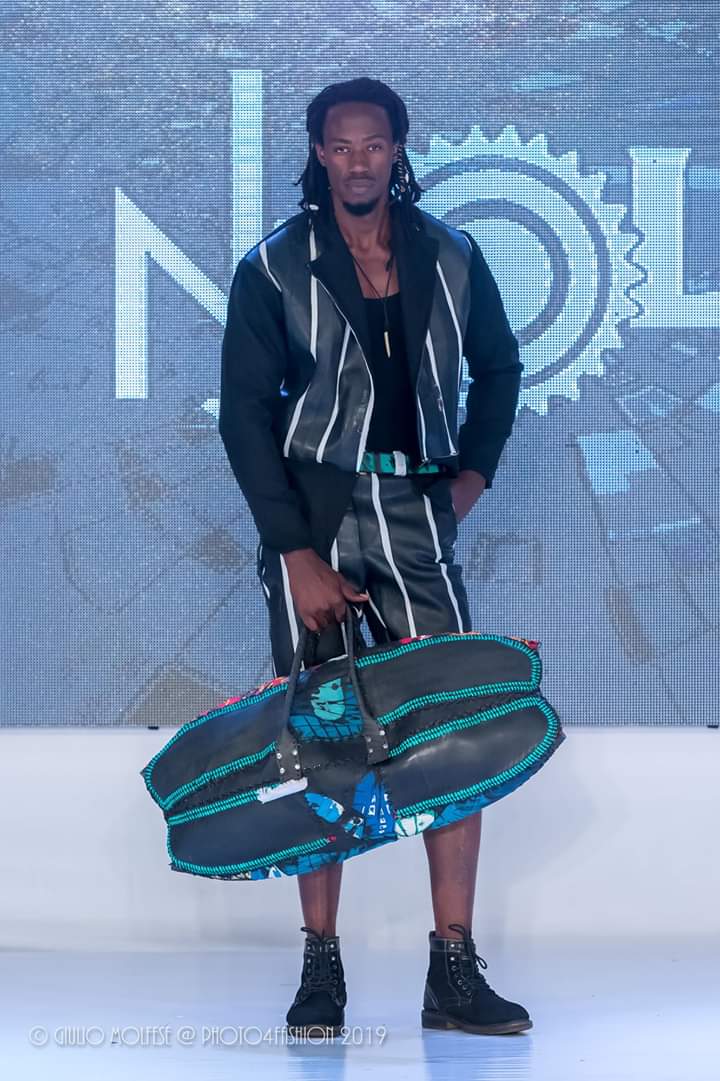
Fashion has exhibited the potential to transform Africa’s economy. A report by the AfDB indicates that the continent’s fashion industry is estimated to be worth more than $31billion, accounting for the second-largest employer of labour on the continent after agriculture.
With Africa’s imminent population boom, estimated to account for more than half of the world’s population by 2050, according to the African Union, and waste generation expected to more than quadruple by 2050, could lucrative sustainable fashion solutions like Allen’s be Africa’s much-needed fix; to lift the strain on its environment while contributing to its GDP growth? Allen certainly agrees.
“Sustainable fashion is the way to go. When you look at the population in Uganda, I think the youths are about 85%, so imagine if all those youths would produce staff out of waste, there would be no waste problem. Everyone should think circular through the 3Rs; Recycle, Repurpose and Reuse.”
